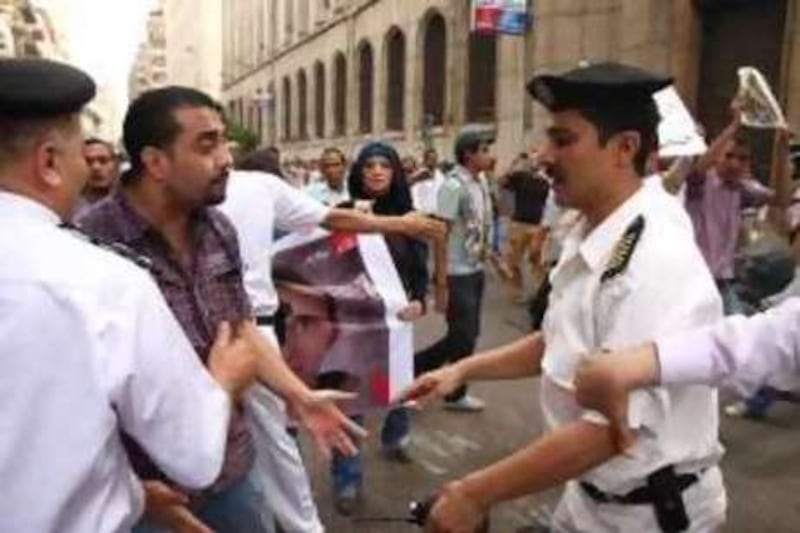CAIRO // The arrest of two undercover policemen accused of beating a businessman to death in Alexandria three weeks ago has been welcomed by lawyers and activists as a first step towards annulling police brutality in Egypt. Prosecutors in the country's second largest city ordered Mahmoud Salah and Awad Ismail detained for four days on Wednesday pending further investigation. They were charged with illegal arrest and brutality in the death of Khaled Said, 28, on June 6.
Witnesses said the two men attacked Said as he entered an internet cafe opposite his home and beat him to death. Two state post-mortems determined that he died of suffocation from swallowing a packet of drugs, however. Said's death, and a photograph taken by his older brother Ahmed, showing him covered with bruises, his teeth broken and jaw smashed, caused an outcry across Egypt. More than 225,000 people have joined a group called "We are all Khaled" on Facebook and many members of the social networking site have put his picture as their profile pictures.
Thousands have attended demonstrations across the country. Last Friday, a rally in Alexandria was attended by Mohamed ElBaradei, a leading reform and opposition figure in Egypt and former director of the UN's nuclear watchdog. Islam el Abaisy, Said's family lawyer, said the arrest of the two men "is a good step" but said the charges were too "lenient". "It would have been a catastrophe if they didn't arrest the two … and didn't start investigating them, three weeks later," Mr el Abaisy said in a telephone interview from Alexandria.
Mohammed Abdel Aziz, a lawyer at the Al Nadim Centre for Victims of Torture, who is involved in the case, said: "We welcome the decision of the arrest, but the prosecution is trying to exclude the charge of premeditated killing to just the use of excessive force and illegal arrest." That charge is punishable by one year in prison or a fine of 200 Egyptian pounds (Dh129). "We'll keep working on changing the charges to premeditated killing and we will present an advisory forensic report to counter the state's two [autopsy] reports.
"This is a murder crime and should be punished as such," he said. Aida Seif el Dawla, the director of the Al-Nadim centre, said it remains to be seen if the arrests are a credible move to investigate the case and or just a tactic to calm the anger Said's death has generated. "My experience tells me it's just to calm people; I hope I'm wrong," she said. "The verdict in this case will be very crucial as it will let us Egyptians know who is ruling this country: the rule of law or the interior ministry."
National and international rights groups have condemned the killing, demanding the punishment of the perpetrators. The United States and European Union have joined these demands. The Egyptian government rejected a statement on Monday by EU envoys in Cairo that noted "discrepancies" between the autopsy reports and witness accounts, calling for an inquiry to be conducted "impartially, transparently and swiftly in a way that will credibly resolve the discrepancies".
On Wednesday the Egyptian foreign ministry summoned the EU envoys and informed them of Egypt's response. Hossam Zaki, the ministry's spokesman, said the statement "constitutes a clear violation of the diplomatic norms and an unacceptable interference by foreign embassies in Egypt's internal affairs". These statements came shortly before announcing that the two undercover policemen had been arrested.
Activists are still planning protests across the country against police brutality and the anti-emergency laws that have been in place for nearly three decades. The laws, introduced by Hosni Mubarak when he became president in 1981 and renewed for a further two years in May, give police wide powers of arrest and the power to detain people indefinitely. Hossam el Hamalawy, an activist who was beaten in June at a protest in Cairo against Said's death, said the policemen would not have been arrested if there had not been such severe pressure on the Egyptian government domestically and from abroad.
"We still have an issue which is the legal penal code for torture in Egypt, it has to change and we will keep up the pressure," Mr Hamalawy said. According to him, Egyptian law labels a crime as torture only if the police commit it with the intention of extracting confessions. If the offence is not carried out during interrogation, the law would label the crime as the illegal use of brute force, which carries a far lesser punishment in court.
For Said's family, even the severest of punishments would not be enough. "Nothing will relieve me, even if they cut these men into shreds," Said's older brother Ahmed said at the family's house in Alexandria last week. @Email:nmagd@thenational.ae * With additional reporting by Reuters and the Associated Press





